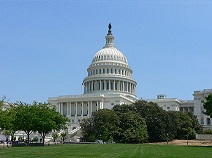Are Federal Caps on Noneconomic Damages Possible Under a Republican Government?
 Federally capping noneconomic damages in medical malpractice verdicts has been the Holy Grail of medical professional liability tort reforms since the first medical malpractice insurance crisis in the 1970s. During that period, states like California passed noneconomic (pain-and-suffering) damage caps as part of more comprehensive medical liability tort reform packages. These caps offered the medical malpractice insurance industry greater predictability in regard to jury verdicts, which brought greater stability to medical liability insurance premiums.
Federally capping noneconomic damages in medical malpractice verdicts has been the Holy Grail of medical professional liability tort reforms since the first medical malpractice insurance crisis in the 1970s. During that period, states like California passed noneconomic (pain-and-suffering) damage caps as part of more comprehensive medical liability tort reform packages. These caps offered the medical malpractice insurance industry greater predictability in regard to jury verdicts, which brought greater stability to medical liability insurance premiums.
Since its enactment, the California Medical Injury Compensation Reform Act (MICRA) of 1975 has been the gold standard of medical liability tort reform legislation. At the heart of MICRA is a $250,000 noneconomic damage cap. More than two-thirds of states have followed California’s lead, enacting similar noneconomic damage caps, but many of those states have had their caps struck down due to the caps violating language in their state constitutions.
Attempts to enact federal noneconomic damage caps have proven fruitless because they face resistance from Democrats as well as the more-conservative members of the Republican Party. Democrats argue that noneconomic damage caps violate the right to have a jury decide actual damages in a civil court case; more-conservative Republicans argue that civil liability lawsuits are the purview of the states and to impose federal caps would violate the Tenth Amendment, which prohibits the federal government from interfering in how states run their civil justice system.
Some Republicans believe they have found a way to mollify the objections of the more-conservative members of their caucus to federal caps on noneconomic damages in medical liability lawsuits. On Feb. 24, Rep. Steve King introduced HR 1215: Protecting Access to Care Act of 2017, which would remove medical liability claims from state court when the injured party receives healthcare through a “federal program, subsidy, or tax benefit.” In other words, if a patient receives healthcare via Medicare, Medicaid, a veterans health plan or receives a premium subsidy from the Affordable Care Act (or whatever the Republicans replace the Affordable Care Act with) or has a tax deduction for healthcare of any kind, there is a federal interest in keeping the cost of care low. Because the federal government would have an interest under the Protecting Access to Care Act, it would be immune from Tenth Amendment concerns and able to impose a cap on noneconomic damages. The Protecting Access to Care Act of 2017 recently passed the Congressional Judiciary Committee, the first significant medical liability tort reform legislation to be approved by the Committee since 2011.
There are still many in Congress who are skeptical that federal-level noneconomic caps are achievable. Three weeks ago, I spoke on the record with Reps. Phil Roe and Andy Barr, who themselves have introduced a bill regarding medical liability tort reforms to this Congress (watch my interview with the Congressmen). Their legislation focuses on creating safe harbors from malpractice claims for those physicians who practice according to predetermined clinical practice guidelines.
“[Noneconomic damage caps] are a bridge too far,” Rep. Roe said. “You will never get caps passed. It’s just not possible. If we had put caps in this legislation, it would be dead. We’ve tried it in the past, and it goes nowhere.”
Part of the impossibility, according to the Congressmen, is that any medical liability legislation will have to proceed via “regular order,” which requires a 60-vote super majority to defeat a filibuster and pass the Senate.
“There are certain things we can and cannot do in the repeal-and-replace agenda via reconciliation; [medical malpractice] reforms need to move through regular order,” Barr said. “In order for us to have a chance to bring eight Democrats along, we have to be sensitive to some of the objections or concerns that have been raised in the past, and there is pretty uniform opposition to caps on noneconomic damages among Democrats.”
Are federal caps on noneconomic damages achievable in this Congress? Time will tell. Please revisit this blog as we will continue to cover everything medical liability as the Republican Party tries to enact their form of healthcare legislation.

